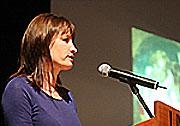Filtering truth?
Plans for mandatory internet filtering may see a wide range of material disappear from computer screens, according to research led by a UNSW academic.
Plans for mandatory internet filtering may see a wide range of material disappear from computer screens, according to research led by a UNSW academic.

Federal Government plans for mandatory internet filtering may see a wide range of material disappearing from Australian computer screens.
Untangling The Net: The Scope of Content Caught By Mandatory Internet Filtering reviews the Australian government's plans for a mandatory internet filter. It examines the nature and scope of content filtered under a mandatory regime, associated public policy implications, and flaws in existing regulatory frameworks.
The report was prepared by leading media public policy specialists and members of the ARC Centre of Excellence for Creative Industries and Innovation, Professors Catharine Lumby, Lelia Green, and John Hartley.
The report is an independent study into the scope of content likely to be caught under mandatory internet filtering plans. Its findings suggest that mandatory filtering will put Australia at odds with most other Western liberal democracies who have opted for self or co-regulation.
According to the report, while mandatory internet filtering is framed as a tool to prevent child pornography access, the Government's policy will catch a far broader scope of content.
The authors also argue that it is time to review Australia's complex and inconsistent media content regulation system to take account of the online era.
"The internet is not a medium: it is an entirely new media environment. We need to rethink our flawed and complex system of media content regulation to respond to this new era," said Professor Catharine Lumby, Director of the Journalism and Media Research Centre at UNSW.
According to a consultation paper released by Communications Minister Stephen Conroy, the government will introduce legislation to create a Refused Classification (RC) list.
Legislation will then be introduced to require all internet service providers (ISPs) to mandatorily filter this list. Under the classification guidelines for RC content, there is clear potential for a far wider range of material to be included than child pornography or active incitement to violence.
While the study found clear public policy reasons for the Government to deny access to information that might facilitate access to child pornography or compromise national security, the authors found that sites promoting public health initiatives such as harm minimisation in drug use, sites dealing with contentious political debates and sites designed to give young people an opportunity to discuss sexuality and safe sexual practices, could also be deemed RC.
"Under mandatory filtering, the pool of internet content filtered will greatly increase, making it even more important that we pay attention to the scope of the content caught and the right of the public to know what they are being protected from," said Professor Lelia Green of Edith Cowan University.
Of a more immediate concern are questions about whether the community will have access to information about what is on the blacklist. The report argues that Australia should apply a classification system that carefully balances the risks and opportunities of the online world.
"Australia needs to avoid simply applying our current flawed and inconsistent media content regulation regime to a media landscape that is still emerging. The challenges of this environment are equally an opportunity for our Federal Government to rethink media content regulation and to engage in a wide-ranging public discussion about how we move into the 21st century," said Professor Lumby.
For the full report click here.
Media contact: Professor Catharine Lumby 0414 897 255 or Susi Hamilton, UNSW media, 0422 934 024